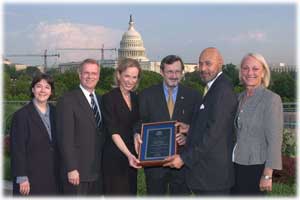
Vol. 77, No. 6, June
2004

ABA honors Rep. Obey for support of civil legal
services funding
Wisconsin Rep. David Obey (D-Wausau) was recognized by the American Bar
Association for his "extraordinary contributions to legal reform
and the administration of justice" at a May 5 reception in
Washington, D.C.
 |
|
(From left) ABA Young Lawyers Division Secretary/Treasurer,
Christina Plum, Milwaukee; State Bar Public Affairs Director Dan
Rossmiller; Christine Bremer, Wausau; Rep. David Obey (D-Wausau); ABA
President Dennis Archer; and State Bar Past President Pat Ballman. |
Rep. Obey, who is serving his 18th term in Congress, is a longtime,
vocal champion of adequate funding for the Legal Services Corporation
(LSC). His impassioned, bipartisan advocacy on the issue in 2003
resulted in a critical increase in funding, which prevented drastic
funding cuts in 26 states, including Wisconsin.
"In 2003, Wisconsin's LSC programs were facing cuts topping
$700,000, a devastating loss for Wisconsin's low-income
citizens," said State Bar President George Burnett. "As
always, Congressman Obey stepped into the breach to advocate in Congress
on behalf of the Legal Services Corporation and Wisconsin's most
needy. We thank him for his continued and tireless commitment."
A similar recognition for Rep. Obey is planned for early this summer in
Wausau.
Court makes sweeping changes to trust
account rules, effective July 1
On April 30, 2004, the Wisconsin Supreme Court issued an order to
repeal and recreate SCR 20:1.15, the rule regarding lawyer trust and
fiduciary accounts, effective July 1, 2004. The amendments to SCR
20:1.15 constitute the most significant changes to that rule since its
inception in 1988.
The new trust account rule has an index, similar to a statute, with
headings for its subsections that are expected to make it much easier to
locate information and requirements. The new rule also provides greater
detail than the current rule on trust account record-keeping
requirements. In addition, it distinguishes between trust accounts and
fiduciary accounts with respect to record-keeping and prohibited
transactions. The new rule also addresses computerized record-keeping,
electronic transactions, separate accounts for probate matters, and
alternatives to overdraft notification. Further-more, it codifies the
Marine case, a 1978 Wisconsin Supreme Court decision that
established what a lawyer must do prior to withdrawing fees from a trust
account.
Order
02-06
Seminar. The State Bar and the Office of Lawyer
Regulation will sponsor a CLE seminar on Wednesday, July 28, from 2 to
4:15 p.m., to educate the Bar regarding the new rule's requirements.
The seminar, offered live in Madison, simultaneously will be offered via
Webcast.
Or call the State Bar at (800) 728-7788 or (608) 257-3838.
|
Court rules attorneys exempt from
Gramm-Leach-Bliley
The American Bar Association, joined by more than 26 bar associations,
was successful in a lawsuit challenging the Federal Trade
Commission's (FTC) decision that lawyers are subject to the privacy
provisions of the Gramm-Leach-Bliley Act if, as part of their law
practice, lawyers provide real estate, tax, estate planning or other
financially related legal advice to individuals. The U.S. District Court
for the District of Columbia ruled that to subject attorneys to the Act
was beyond its statutory authority and constitutes arbitrary and
capricious agency action. The FTC has until July 12 to decide whether to
appeal.
In response to the ABA's request, the general counsel of the FTC
has issued a letter stating that unless and until the district
court's decision is reversed, the FTC will not bring enforcement
actions against or investigate any practicing lawyer for failing to
comply with the Act's privacy provisions. The ABA asked the FTC for
this assurance because many attorneys have requested guidance about
their responsibilities in light of the district court's
decision.
While the ABA is hopeful that the court's decision will stand, the
ABA also seeks Congressional action on this issue. In 2001, the New York
Bar Association (NYSBA) and the ABA challenged the Act's application
to lawyers. The State Bar of Wisconsin joined with Ohio in its amicus
brief to the NYSBA's action against the FTC.
Mandatory court form updates include criminal
and family
As of April 29, the Wisconsin Records Management Committee, an advisory
committee to the Director of State Courts Office, which develops and
distributes mandated forms, has updated and introduced the following
forms. Key: New (N)/Revised (R)
Criminal
-
CR-206 Order for Competency Examination (R)
-
CR-236 Judgment and Commitment Order for Sexually Violent Person
(R)
-
CR-277 Order for Examination under 971.17(4)(c) (Not Guilty by Mental
Disease or Defect) (N)
Updated to comply with 2003 Act 121, effective May
1
-
CR-227 Plea Questionnaire (R)
Updated to comply with 2003 Act 187, effective April
22
-
CR-237 Order Denying Petition for Supervised Release (R)
-
CR-238 Order for Supervised Release Plan (R)
-
CR-239 Order for Supervised Release (R)
Family
-
FA-604 Stipulation and Order to Amend Judgment for
support/Maintenance/ Custody/Placement (R)
-
FA-608 Family Medical History Questionnaire (form summary only)
(R)
Forms, summaries, background, and information on using standard court
forms are available in PDF or MS Word format at www.wisbar.org/forms.
For more information, contact Judy Mahlkuch at (608)
266-7143.
First class of Spanish and sign language
interpreters sworn in
Fourteen graduates of the Wisconsin Court System Interpreter Training
and Certification Program were sworn in by Chief Justice Shirley S.
Abrahamson (at podium) on May 25. Director of State Courts John Voelker
(right of Abrahamson) looks on as the first class of Spanish and
American Sign Language interpreters take the oath. To meet the
requirements for certification, court interpreters must demonstrate a
clear understanding of legal terminology, complete a two-day training
program, and pass a multi-part written exam and a lengthy oral exam. Of
the 34 Spanish language interpreters who reached the oral exam phase,
eight passed. The 25 percent pass rate exceeds the average national rate
of 12 percent. Hmong, Russian, Arabic, and a second Spanish oral exams
will be offered later this year.
Wisconsin Lawyer
